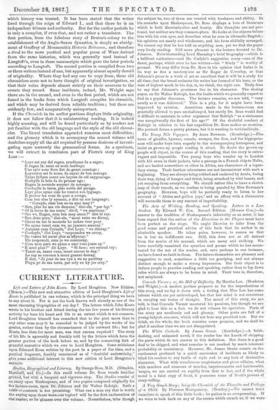Studies, Biographical and Literary. By George Ross, M.D. (Simpkin, Marshall,
and Co.)—In this small volume Dr. Ross treads familiar ground, but with a buoyant and vigorous step. The Studies consist of an essay upon Shakespeare, and of two papers composed originally for tlars lecture-room, upon Dr. Johnson and Sir Walter Raleigh. Such a table of-contents is not promising. What can a man say that is worth the saying upon these worn-oat topics? will be the first exclamation of tha reader, as he glances over the volume. Nevertheless, trite though the subject be, two of them aro treated with freshness and ability. In his remarks upon Shakespeare, Dr. Ross displays a love of literature which is both discriminative and hearty. His thoughts are not pro- found, but neither are they common-place. He looks at the objects before him with his own eyes, and describes what he sees in idiomatic English ; his opinions are manly and wholesome, and his facts skilfully arranged. We cannot say that he has told us anything now, yet we find the paper very lively reading. Still more pleasant is the lecture devoted to Dr. Johnson. Notwithstanding Lord Macaulay's brief biography—which is a brilliant caricature—and Mr. Carlylo's suggestive essay—one of the finest, perhaps, which even he has written—his " Study " is worthy of perusal. We may differ from Dr. Ross in his opinion that Itulac is in its way as fine a mastorp'ece as Sir Roger do Covorley, or that Johnson's prose is a work of art so excellent that it will be a study for all time ; but the broad estimate the writer has formed of his hero, as the man of highest mark in his day, is, we think, the right ono. Truly does ho say that Johnson's greatness lies in his character. The closing paper, on Sir Walter Raleigh, has the faults which we generally expect to find in a popular discourse. The lecture remains, we are told, "very nearly as it was delivered." This is a pity, for it might have been improved by revision. Assertions made in the lecture-room are generally allowed to pass unchallenged, but surely Dr. Ross would find it difficult to maintain in sober argument that Raleigh "as a statesman was unequivocally the first of his age?" Of the doubtful conduct of Raleigh in relation to his last expedition Dr. Ross makes no mention. His portrait forms a pretty picture, but it is wanting in verisimilitude.






























 Previous page
Previous page